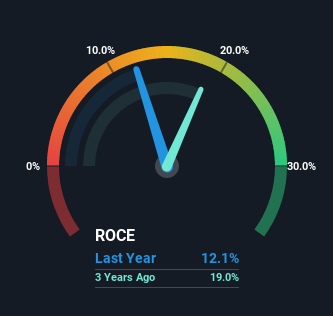- Hong Kong
- /
- Commercial Services
- /
- SEHK:6812
Winson Holdings Hong Kong (HKG:6812) Will Be Hoping To Turn Its Returns On Capital Around
If we want to find a potential multi-bagger, often there are underlying trends that can provide clues. Firstly, we'll want to see a proven return on capital employed (ROCE) that is increasing, and secondly, an expanding base of capital employed. Ultimately, this demonstrates that it's a business that is reinvesting profits at increasing rates of return. In light of that, when we looked at Winson Holdings Hong Kong (HKG:6812) and its ROCE trend, we weren't exactly thrilled.
Understanding Return On Capital Employed (ROCE)
If you haven't worked with ROCE before, it measures the 'return' (pre-tax profit) a company generates from capital employed in its business. To calculate this metric for Winson Holdings Hong Kong, this is the formula:
Return on Capital Employed = Earnings Before Interest and Tax (EBIT) ÷ (Total Assets - Current Liabilities)
0.12 = HK$25m ÷ (HK$264m - HK$55m) (Based on the trailing twelve months to March 2022).
Thus, Winson Holdings Hong Kong has an ROCE of 12%. In absolute terms, that's a satisfactory return, but compared to the Commercial Services industry average of 7.9% it's much better.
Check out the opportunities and risks within the HK Commercial Services industry.

While the past is not representative of the future, it can be helpful to know how a company has performed historically, which is why we have this chart above. If you'd like to look at how Winson Holdings Hong Kong has performed in the past in other metrics, you can view this free graph of past earnings, revenue and cash flow.
What Can We Tell From Winson Holdings Hong Kong's ROCE Trend?
When we looked at the ROCE trend at Winson Holdings Hong Kong, we didn't gain much confidence. To be more specific, ROCE has fallen from 25% over the last five years. Given the business is employing more capital while revenue has slipped, this is a bit concerning. This could mean that the business is losing its competitive advantage or market share, because while more money is being put into ventures, it's actually producing a lower return - "less bang for their buck" per se.
On a side note, Winson Holdings Hong Kong has done well to pay down its current liabilities to 21% of total assets. That could partly explain why the ROCE has dropped. Effectively this means their suppliers or short-term creditors are funding less of the business, which reduces some elements of risk. Some would claim this reduces the business' efficiency at generating ROCE since it is now funding more of the operations with its own money.
The Key Takeaway
In summary, we're somewhat concerned by Winson Holdings Hong Kong's diminishing returns on increasing amounts of capital. Despite the concerning underlying trends, the stock has actually gained 33% over the last five years, so it might be that the investors are expecting the trends to reverse. Regardless, we don't like the trends as they are and if they persist, we think you might find better investments elsewhere.
On a final note, we've found 3 warning signs for Winson Holdings Hong Kong that we think you should be aware of.
While Winson Holdings Hong Kong isn't earning the highest return, check out this free list of companies that are earning high returns on equity with solid balance sheets.
Valuation is complex, but we're here to simplify it.
Discover if Winson Holdings Hong Kong might be undervalued or overvalued with our detailed analysis, featuring fair value estimates, potential risks, dividends, insider trades, and its financial condition.
Access Free AnalysisHave feedback on this article? Concerned about the content? Get in touch with us directly. Alternatively, email editorial-team (at) simplywallst.com.
This article by Simply Wall St is general in nature. We provide commentary based on historical data and analyst forecasts only using an unbiased methodology and our articles are not intended to be financial advice. It does not constitute a recommendation to buy or sell any stock, and does not take account of your objectives, or your financial situation. We aim to bring you long-term focused analysis driven by fundamental data. Note that our analysis may not factor in the latest price-sensitive company announcements or qualitative material. Simply Wall St has no position in any stocks mentioned.
About SEHK:6812
Winson Holdings Hong Kong
An investment holding company, provides environmental hygiene and related, and airline catering support services in Hong Kong.
Flawless balance sheet and slightly overvalued.
Market Insights
Community Narratives


Recently Updated Narratives


Q3 Outlook modestly optimistic


Alphabet: The Under-appreciated Compounder Hiding in Plain Sight


MINISO's fair value is projected at 26.69 with an anticipated PE ratio shift of 20x
Popular Narratives


The company that turned a verb into a global necessity and basically runs the modern internet, digital ads, smartphones, maps, and AI.


MicroVision will explode future revenue by 380.37% with a vision towards success



